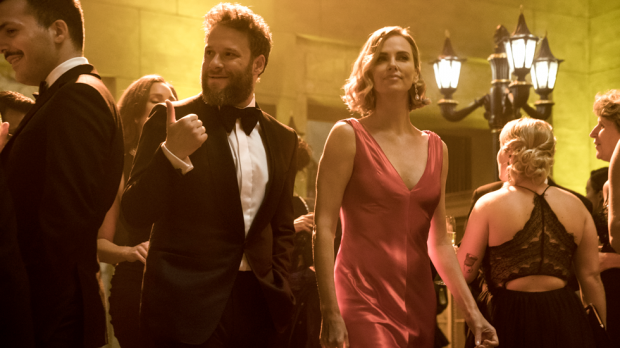
Directed by Jonathan Levine
Starring Charlize Theron, Seth Rogen, June Diane Raphael, Bob Odenkirk
It’s difficult to imagine Seth Rogen as a manic pixie dream girl. Seriously difficult. OK, we’re talking about “blood shooting from the ears as the brain tries to process that thought” difficult. Yet this is something that Long Shot manages to do, and not just do it successfully, but to create something that is enjoyable and capable of occasionally touching upon a romantic truth.
A down on his luck writer, Fred Flarsky (Rogen), gets an outstanding opportunity as he is selected to punch up the speech writing of the Secretary of State, Charlotte Field (Charlize Theron), as she starts a run at the presidency of the United States. Despite a shared past, the two come from very different worlds and perspectives, yet they both find something attractive in the other as they hit the campaign trail.
In fairness, Rogen really does more fulfill the part of manic pixie dream girl in terms of role in the rom-com genre plot, rather than strict adherence to the archetype, but there are some certain broad similarities. He’s quirky and self-doubting, but willing to continue with his own unique brand of personality that creates a romantically charming figure… in a certain light. In Long Shot, that’s enough to offer an alternative to the career bound Field. Yes, it’s a change in gender roles and associated traditional power structures, but Long Shot feels different. It’s not merely a gender flip of those roles, but it seems more like a genuine shift to equality.
Which leads to some serious romantic chemistry between Rogen and Theron, sandwiched among the laughs and the gross out comedy. This is a testament to Theron as an actor, as she really manages to make something of the role, by engaging in a performance that is low key yet captivating. She articulates something that is genuine in her character, torn between romance and political aspirations and feeling for the first time that power may not be the only thing she desires. This is not to diminish Rogen, it’s just his performance travels well-worn ground for the comedic actor. But that chemistry brings an emotional core to the film, one that is a lot more fragile than expected, and capable of making audiences care about the vulnerability of this “will they/ won’t they” relationship.
Hence Long Shot surpasses expectations, as it forces us to care about an unlikely pairing. We question both the expectations placed on public figures’ private lives, and the priorities we place on career above relationships. The result is far more nuanced than first glance would suggest, yet still excruciatingly funny.
DAVID O’CONNELL
Notifications